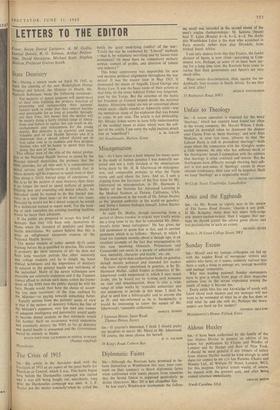LETTERS TO THE EDITOR
From: Seven Dental Lecturers, A. M. Collin, Samuel Dennis, R. G. Salmon, A rthur Potters- man, David Stevenson, Michael Scott, Stephen Skelton, Professor Grover Smith.
State Dentistry
SIR.---During a speech made on April 30, 1965. to mark the opening of the new Birmingham Dental Hospital and School, the Minister of Health, Mr. Kenneth Robinson. made the following statement: The majority of dental surgeons will spend most of their time fulfilling the primary function of preserving and safeguarding their patients' natural teeth in order that they remain healthy and serviceable for as long as possible through- out their lives; this means that the dentist will
be mainly doing a fairly limited range of opera- tions and failure to realise this can result in dis-
enchantment and unhappiness for the young dentist. But dentistry is an essential and most valuable part of our Health Services and it is important that a dental school should get its true value over to its students and thus produce dentists who will be happy to spend their lives doing this sort of work. This official view of the role of the dental profes- sion in the National Health Service as stated by the Minister himself demolishes the pretence that the NHS provides, for all who seek it, a comprehensive dental service, and furthermore it reveals that in future dentists Ain be expected to spend most of their lives doing a 'fairly limited range of operations.' If this is to be the pattern of state dentistry then there iS no longer the need to spend millions of pounds building new and extending old dental schools. An Individual could be trained to do this limited den- tistry in a very short time—at the most two years. However he would not be a dental surgeon, he would he a technician trained to repair teeth. For the train- ing of such operators the existing teaching facilities Would be more than adequate.
If the public are prepared to accept this level of dentistry then they will have only themselves to blame when the standard of dentistry and dental health deteriorates. We cannot believe that this is What an enlightened electorate expects of the National Health Service.
The dental student of today spends 41-51 years training before he is qualified to practise. His course is probably the most intensive of all-- he does not have long vacation periods like other university and college students and he is taught the latest clinical techniques and the importance of dentistry in relation to the general health and well-being of the individual. Many of the newer techniques now available are relatively expensive and if the Treasury cannot afford to include such items within the frame- Work of the NHS then the public should be told the !acts. People would then have the choice of accept- ing free state treatment--of the type outlined by the Minister—or paying towards something better. Equally serious from the patients' point of view IS that if the pattern of dentistry follows the line of
the Minister's statement, very few men and women 01 adequate intelligence and personality would apply to become dental students so that standards would fall further. Such an occurrence would undermine and eventually destroy the NHS so far as dentistry and dental health is concerned and the Government Would be entirely to blame. SLVLN PART-1IME LECTURERS IN DENTAL SURGERY (Names supplied) MancheSter


































 Previous page
Previous page